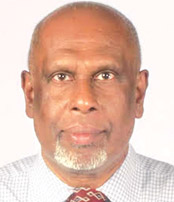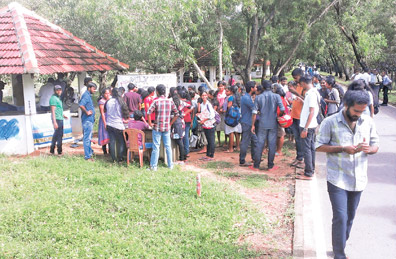Stand above parochial loyalties
Prof. Kalinga Tudor Silva on the role of universities
in post-war reconciliation in Sri Lanka :
 |
|
Prof. Kalinga Tudor Silva |
Post-war rebuilding in Sri Lanka
should serve two related purposes. One is to rebuild infrastructure
including houses, hospitals, roads, railways, public buildings and
livelihoods destroyed during nearly three decades of armed conflict.The
universities and research institutions in the country have a critically
important role to play in promoting social harmony among war-torn
communities. The social and political marginalization of universities
from the ongoing processes will be counter-productive and harmful to
widespread aspirations in the country, says Prof. Kalinga Tudor Silva of
the University of Peradeniya delivering a speech at the Convocation of
the University of Ruhuna recently.
Excerpts of the speech
Six years after the end of war we have not made much progress in
terms of achieving post-war reconciliation in Sri Lanka. However,
imperfect it may be at present, peace has been finally restored in the
country and a rebuilding of physical infrastructure in the
conflict-affected regions is currently under way. In the meantime the
LLRC recommended some useful steps towards promoting reconciliation
among war-weary people who are divided by generations of mistrust,
mutual suspicion and hatred.
Even though the universities themselves have been affected by ethnic
polarisation in society, it is up to the university system to stand
above parochial loyalties of various kinds and muster a future vision of
a united Sri Lanka, where ethnic and religious diversity in the country
is recognized and respected while also fostering a more inclusive notion
of Sri Lankan citizenship, social justice and human rights.
 |
|
Pic: Courtesy
fag.esn.ac.lk |
You must master your first language, a second language and a third
language as well. The first language will be your mother tongue, the
second language will be Tamil for Sinhala speakers and Sinhala for Tamil
speakers and third language will be English which will be your passport
to universal knowledge and basis for interaction with the world at
large.
Ghettoization of universities
Universities are a microcosm of society. Ethnic tension and
polarisation in society did not spare the university system. A number of
factors, including the JVP uprisings in the 1970s and 1980s and the war
in the subsequent era and related economic downturn and insecurity,
served to accelerate the processes of brain drain, at the same time,
aggravate student indiscipline in university campuses across the
country.
The universities themselves became ethnically polarised to some
extent at least with the pre-existing ethnic mix of staff and students
in the universities declining over the years and the emergence of
so-called regional universities with an ethnic concentration in spite of
the UGC efforts to diversify student intake in each of the universities.
Some observers have referred to a process of ethnic ghettoization of
universities in Sri Lanka and described it as something harmful to the
very objective of universality of university education (Rajasingham-Senanayake
1999, Wickramasinghe 2009).
This process, however, is not limited to Sri Lanka and the
universities becoming centres of cultural renaissance is perhaps
unavoidable in this era of identity politics and group rights (Huskanovic
2012).
What is worse is a kind of insular thinking that has invaded our
university system side by side with the above institutional
developments.
This insular thinking has many signs and symptoms. Lack of open
discussion about contemporary issues affecting the country is one
manifestation of this insular thinking. Academics and students forming
themselves into narrow factions that seek to eliminate each other is
another aspect of this syndrome.
Terror and violence, including symbolic violence of the type
described by Pierre Bourdieu (1989), are used not only by one group of
students against another but also by certain academics in order to
attack, demotivate and deprive others of free thinking. Even in the
universities where there is considerable ethnic diversity among students
as indeed is the case with University of Peradeniya, where I come from,
interaction among Sinhala, Jaffna Tamil, Indian Tamil and Muslim
students is hampered due to language barriers, medium-wise segregation,
ethnic prejudices and mutual mistrust.
The ‘class war’ among the students between so-called raggers (who
resort to ragging of new entrants as a necessary means of bringing them
to a common platform where there is no room for dissent) and anti-raggers
who resist their forcible induction into a herd mentality adds to
insular thinking and conflict dynamics so much so that there is
avoidance behaviour and segregated spatial utilization on the campuses
(Silva 2004, Silva, Wattegama, and Kamalarathna 2009).
Irreversibly affected
Politicisation of decision making and recruitment already well
entrenched in the public sector has made inroads into the university
system as well.
This indicates the universities themselves have been deeply and
perhaps irreversibly affected by the social pathologies that engulfed
the country over the past several decades.
In this context, it is perhaps understandable why a high ranking
university administrator once identified universities as “the remaining
uncleared areas” that implicitly require sustained military intervention
following the end of the war (Fonseka 2011).
Narrow ethnonationalisms of various forms and shapes that drive much
of the political process and policy dialogue in the country at large is
simply insular thinking writ large preventing adoption of successful
reconciliation efforts to heal the wounds of war. Apart from war
triumphalism of the state, the coming to prominence of a genre of
‘patriotic movies’ and teledramas signifies the reproduction of insular
mentalities in popular culture.
The universities themselves perhaps need to go through a process of
healing as part and parcel of the post-war transformation in Sri Lanka.
While this is indeed needed, it is essential to tap intellectual
resources in the universities in order to identify policies, programmes
and interventions needed to overcome challenges and maximize
opportunities offered by the end of war.
National security concerns are of utmost importance in an environment
where global terror networks pose new security challenges. However,
winning hearts and minds of people traumatized by war and who have
literally become ‘frogs in their wells’ (kupamandika) protected,
sheltered and captivated by competing brands of ethno-nationalisms may
be equally if not more difficult than winning the war itself (Sen 1999).
A much more enlightened humanitarian approach is necessary to rebuild
mutual trust among communities. It is here that insights from humanities
and social sciences, including policy dialogues informed by such
insights, should be explored to their full potential. On the other hand,
the universities need to become awakened to their mandate and indeed
national responsibility to contribute towards knowledge production and
policy formulation.
Educational processes themselves have multiple challenges from the
angles of bringing ex-combatants into the ambit of educational and
training programmes including those offered at the university levels.
Education for peace
There is a need to create academic and research collaborations
between universities in North, East, Centre and South, which in turn can
become effective inter-ethnic bridges or bridging social capital,
facilitating the flow of information and the cross fertilization of
knowledge and ideas across the ethnic divide (Silva 2004, Wickramasinghe
2009).
As regards student exchanges a semester of study for a student from a
Southern university in a university in North or East and vice versa
along with favourable living experiences in a host family on the other
side of the ethnic divide can certainly serve to broaden their
perspectives.
There is an urgent need for curriculum change in social sciences and
humanities as well as in so-called hard sciences for preparing students
to work in multi-ethnic and multi-religious settings where certain
language skills as well as attitudinal changes are necessary for
effective functioning.
A number of universities in Sri Lanka, including the University of
Ruhuna, have commenced peace and conflict studies programmes at the
undergraduate and post-graduate levels and it would be necessary to
evaluate and strengthen these study programmes in order to enhance their
effectiveness in promoting peace and harmony in the country.
The time after your graduation may be a good period for you to
improve and enhance your language competencies in second and third
languages in particular.
These language competencies will certainly enhance your employment
prospects.In conclusion, the universities in Sri Lanka have a central
role to play in facilitating post-war reconciliation in Sri Lanka.
Among other things there is need for curriculum change, academic and
student exchanges across various divides, research to identify existing
barriers for reconciliation and peace and ways of overcoming them and
identification and development of social bridges across social divisions
of various kinds.
It is absolutely necessary that the leadership and the staff and
students of the universities come forward to overcome the current
challenges and realize their full potential as agents of social
transformation in this moment of critical social formation and need for
healing the wounds of war.
(Earlier versions of this paper were delivered as the Chief Guest of
the Annual Research Sessions of the Faculty of Education, Open
University of Sri Lanka on February 3, 2010 and at the National
Conference on the ‘Role of Higher Education in Peace and Reconciliation’
convened by the University Grants Commission in June, 2013 in Jaffna)
|

